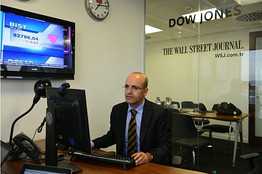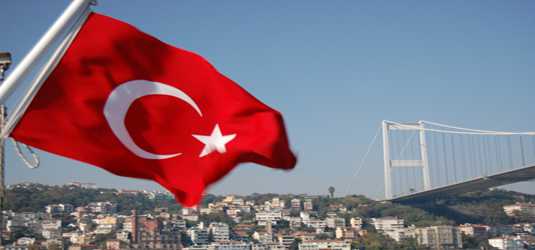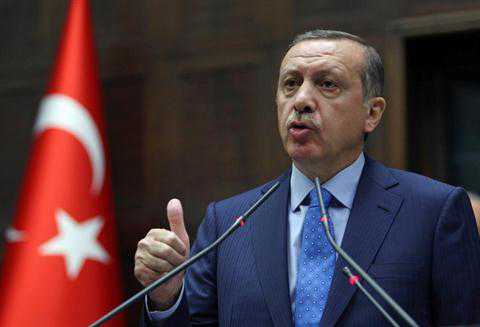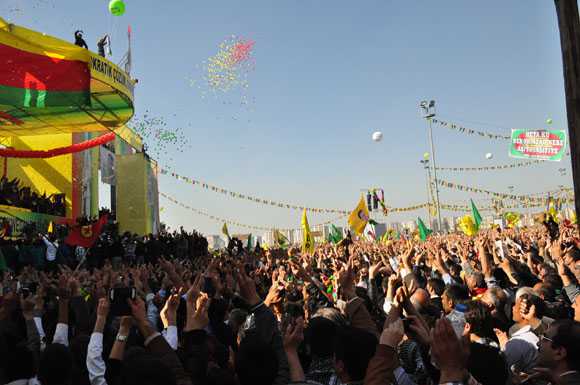By Valeria Giannotta
 On 21 March 2013, the beginning of spring was celebrated in Turkey. During the Nevruz festival in the southeastern province of Diyarbakir, Abdullah Öcalan – the jailed leader of the PKK (Kurdistan Worker Party) – sent out a clear message, after long negotiations with the AKP government. “The guns should fall silent and politics should come to the forefront,” was Ocalan’s message. “The stage has been reached where our armed forces should withdraw beyond the borders. It is not the end; it is the start of a new era.”
On 21 March 2013, the beginning of spring was celebrated in Turkey. During the Nevruz festival in the southeastern province of Diyarbakir, Abdullah Öcalan – the jailed leader of the PKK (Kurdistan Worker Party) – sent out a clear message, after long negotiations with the AKP government. “The guns should fall silent and politics should come to the forefront,” was Ocalan’s message. “The stage has been reached where our armed forces should withdraw beyond the borders. It is not the end; it is the start of a new era.”
With this statement from the longtime icon of the Kurdish movement, Turkey seems to have reached a crucial turning point. It signifies a concrete hope for the Kurdish people, who have long been fighting for equal rights and the full recognition of their identity, against the assimilation assumption in Turkish constitutional law.
The ‘Kurdish Issue’ has always been the most critical and hotly-debated one concerning the structure of Turkey as a modern state. In the process of nation-building from 1923, secularization and securitization have played a key role, aiming to establish a new identity acceptable to all the ethno-religious elements of Turkey. However, although it was proclaimed that sovereignty resided in the ‘Turkish nation,’ establishing a modern state was not an easy task; from the very beginning, governments had to face the problem of Anatolia’s non-Turkish Muslims. Indeed as it is constitutionally recognized that all people born in Turkey are Turks, it is this specific ethno-cultural dimension that emphasizes the uniqueness of being Turkish.
Ethnic Status and Defining National Unity
The critical issue of the Kurdish population emerged as a natural outcome of these dynamics. Belonging to a different ethnic group, and speaking a different language, the Kurds sought the right to freely express their identity- without this being perceived as an obstacle to inclusion in the Turkish nation. Since in legal terms the Kurdish population is not identified as an ethnic or religious minority, the issue is substantially related to some people with their own history, culture and language and a particular attachment to a specific territory, assimilated by Constitutional law to the Turkish State.
Today, the status of the Kurdish population is the most important ethnic problem for Turkey. As a result of the urbanization process, a large number of Kurds moving to major urban centers have developed a greater sense of ethnicity, one which has been reinforced by the violent acts of the PKK over the past three decades. The result is a quite clear separation between the Kurdish minority and the majority of the Turkish population.
In the last 30 years, the PKK – recognized as a terrorist organization by Turkey and much of the international community – has waged a bloody campaign for autonomy and self-rule in predominantly Kurdish regions of Southeastern Anatolia. In that time, more than 40,000 people (including civilians and security forces) have been killed. However, more moderate Kurdish groups have been disassociating themselves from violence against civilians, and they have also been committed to finding a political solution within the existing unitary state and the democratic parliamentary system.
Facing this critical situation in the past decade Turkey has taken significant steps by expanding cultural and political rights for the Kurds. For the first time since the foundation of the modern Republic, Prime Minister Erdoğan and his AKP government have addressed the issue by stressing that in the past Turkey had made mistakes. They say that the Kurdish issue should be resolved through the process of democratization, in full respect for the principles of ‘a single state, one nation and one flag’, where Islam is the cementing force for national unity.
AKP Electoral Success and the Kurdish Vote
Since its rise to power in 2002, the AKP attitude has been able to frame the Kurdish issue within the parameters of freedom and political rights, through the ongoing reforms process related to the goal of full EU accession. Although these claims have not always been followed by effective sweeping policy changes, but rather by small concessions like allowing television and radio broadcasts in Kurdish, the AKP approach to the problem indicates a significant distancing from those of other parties in Turkey. Moreover, such de facto recognitions helped the governing party gain substantial support from Southeastern Anatolian districts in the 2007 elections. Indeed, in that electoral race AKP secured 46.6% of the vote and a total of 550 seats in Parliament, marking the largest margin of victory for a single-party government since 1960.
Similarly, AKP’s success has been in part dependent on the votes from those provinces where Kurdish citizens constitute a dominant majority. A geographical analysis of the election results, in fact, shows that the Conservative Democrats have been able to divide the Kurdish electoral space in two- between pro-AKP and pro-Kurdish party blocs.
This significant support from the eastern provinces has contributed to a robust mandate for the current government, especially useful for its attempt of constitutional reform. However, despite the hopes and assumptions, no coherent policy has been developed, mainly because of the lack of consensus from the opposition. In fact, neither CHP nor MHP have welcomed the so-called ‘democratic opening’ because they claim it is liable to increase the risk of the disintegration of the country along ethnic lines.
According to this interpretation it is not surprising, therefore, that there was unanimous support in the Constitutional Court for closing down the Kurdish Democratic Society Party (DTP) in 2009. The court accused it of “being the focal point of activities against the country and the indivisible unity of the state.”
Despite these disagreements, the impressive results of the 2010 referendum have instead played a significant role in Turkish politics. By winning the confidence of 58% of the voters, AKP has been legitimized and thus more determined to proceed with a number of reforms aimed at amending the still existing 1982 military constitution. Their stated goal was to transform the ‘bureaucratic republic’ to a ‘democratic’ one, by changing the constitution.
This pledge put Prime Minister Erdoğan in position to emerge victorious from 2011 election, with significant popular support (close to 50%). Such a result brought awareness among the AKP’s Kurdish counterpart that the ruling party intends to remain in power for a long time. However, the fact that another three million votes still went to the BDP – the Kurdish Democratic Party – has underlined the urgency of a compromise with the “Turkish Kurdistan” as essential to resolving the thorny issue.
The Return to Violence and Regional Concerns
Paradoxically, while the AKP strengthened its dominant position nationally with these elections, it also lost ground among Kurdish supporters. The common expectation was that a second democratic initiative would be launched, not something indicating simple political maneuvering. Indeed as a reaction to the situation, violence has been escalating in Southeastern Turkey, and ethnic divisions have been sharpened.
With the resumption of the guerrilla fighting came the terrorist attack in Hakkari province of October 2011- one of the bloodiest episodes to have occurred in Turkish territory. Turkey responded by launching a quick counter-offensive in northern Iraq, and a series of joint operations on the domestic level, leading to the arrests of numerous accused sympathizers of the PKK. These included several members of the BDP, as well as Busra Ersanli, a university professor and member of the parliamentary committee for constitutional amendments.
Further, with the escalation of violence it is worth mentioning the large-scale military operation carried out by the Turkish military in December 2011. This resulted in the killing of 35 young smugglers, mistaken for guerrillas, in the region of Uludere near the Iraqi border. Even if it was called “a tragic operating mistake” by the Turkish state, it contributed to sparking street protests in Turkish cities, heightening the animosity towards the government.
Thus the ‘Kurdish issue’ is for politicians not just a matter of internal politics, but also an issue with real regional repercussions. The Turkish military operations in Southeastern Anatolia and in northern Iraq have soured relations with Baghdad. On a second front, Ankara’s position towards Syria involves the desire to exert some influence on Kurdish issues in Syria before the eventual successor to Assad. The strong links between Damascus and the Syrian branch of the PKK dates back at least to the early 1980s, and in the 1990’s Abdullah Öcalan himself had been sheltered in Syria. Furthermore the concern for the Kurdish separatist threat is shared with Iran too: the Tehran regime feels threatened by the action of the separatist PJAK (Party of Free Life of Kurdistan), as PKK and in its close coordination, aspiring to territorial autonomy for the Kurds there.
Taken in its regional context, the Kurdish issue is a litmus test for both Turkey’s full domestic maturity and its external projection as a regional leader, converging democratic opening policies and the evergreen strategy of “zero problems with neighbors.” Here arises the need for strong internal solidarity that has become crucial in a time of turmoil, and above all in a time of new electoral campaigning. Therefore, the call for a ceasefire last March would have to be included in this framework.
The withdrawal of armed members of the PKK from Turkey is a priority for resolution of the country’s ‘terrorism problem.’ It is expected to happen by the end of 2013. If it does happen, it will pave the way for further AKP success in 2014 local and presidential elections. As the main interlocutor in ongoing talks with Abdullah Öcalan, Prime Minister Erdoğan has been perceived as the leading figure in the peace process since last October. After he got the public support of the jailed PKK leader, he became more willing to develop a valuable road map for addressing Kurdish issue, appointing a commission of ‘wise men’ to develop it.
Such a success would definitely open the way for Erdoğan’s presidential candidacy. Indeed, although working on the issue outside of Parliament is not perceived as a valid solution by the opposition, it seems the safest option- both for personally carrying out the process and for avoiding sabotage. Already during the crucial time of the last negotiation, some of the minutes of a recent meeting between BDP delegation and Öcalan were leaked to the press, as an apparent move to disturb the positive atmosphere around a hypothetical solution of the longstanding conflict. Before this, another attempt to boycott the negotiation occurred in September 2011, when a tape recording revealed secret talks between Turkish government officials and members of the PKK in Oslo.
Turkey seems to have come to a historic turning point, and its leaders will seek to prevent any impulse aimed to fragment rather than consolidate the results obtained. In the country – and even among the overall Kurdish population – there is optimism, which leaders are keen to not see disappointed. The road towards democratic coexistence is open, but the way still remains uphill. A mutual embrace from all parties involved would be the first step towards settling the issue. Without cohesion and awareness there is the risk of perpetuating and exacerbating a real clash of civilizations, both within and beyond Turkey’s borders. And that could trigger the beginning of a much hotter spring in Turkey.





